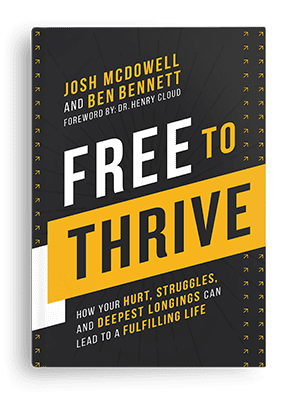The rates of individuals struggling with depression have continued to rise throughout the years. During the pandemic in 2020, 41.5% of American adults reported symptoms of anxiety and depression. Almost half of young people (47%) report being moderately or extremely depressed. Depression affects people from all walks of life, including strong Christians.
The reality is that depression often tells a deeper story. Like lights on a dashboard, it is often a signal that things in our lives need attention. It is telling us important information that needs attending to.
As the Psalmist asks in Psalm 43:5, “Why are you downcast, O my soul?” We can do the same. Here are three things depression might be telling you.
Depression may be telling you: “You need connection”
God created us to need one another; to have meaningful connection with others daily. The New Testament uses the phrase “one another” exactly one hundred times and puts an emphasis on connecting with others in meaningful ways. This means talking with others about how we are truly doing, what we are thinking and feeling, and experiencing those things affirmed by safe people.
Isolating physically and relationally from others can present a number of symptoms including depression. Scripture makes it clear that our well-being in life is directly tied to our relationships. “Two people are better off than one, for they can help each other succeed.” Ecclesiastes 4:9
Depression may be telling you: “There is pain that needs healing”
This could be pain from loss, heartbreak, or abuse. Depression can often appear when the pain of what we have been through is immense. In turn, we can start to feel hopeless about ourselves, our situation, or the future.
We witness this throughout the Scriptures. For example, Job, who was called a “blameless” and “upright” man, after losing his health, wealth, and family, was so depressed that he wished he had never been born (Job 3). King David was depressed after long being oppressed by his enemies (Psalm 13:2). Elijah became depressed and suicidal in response to Queen Jezebel seeking to kill him (1 Kings 19).
God went to great lengths in Scripture to affirm the reality of mental health challenges, including depression, and to show how common to the human experience they are. Experiencing depression does not mean someone lacks faith in God, or is less spiritually mature. Some of the godliest people in the Bible struggled with their mental health.
As Proverbs 13:12 says, “Hope deferred makes the heart sick.” A heavy heart of depression can follow pain that has caused us to lose a feeling of hope.
Depression may be telling you: “There are lies you believe that need dismantling”
Psalm 22:6 says “Train up a child in the way he should go; even when he is old he will not depart from it.” The opposite is also true. When we experience negative and painful experiences in childhood, they set the course for how we view ourselves and relate to others.
As a child, I experienced name-calling, bullying, and abuse from my father. Consequently, I believed deep down that I was worthless and inadequate. This led into adulthood. As a young adult, whenever I messed up, didn’t follow through, let someone down, didn’t perform perfectly, or couldn’t do what I had committed to, I would feel worthless. It was as if I was experiencing the emotions of all of those painful times from the past at once—in the present.
One Spring, I had overcommitted to responsibilities in ministry: long days, hours upon hours of emotional investment, and countless meetings each week. I tried to push through, but eventually an overwhelming feeling of inadequacy and exhaustion caught up with me. Negative thoughts about myself played on a never-ending loop. The scripts about myself from my childhood overtook me like an avalanche. Worse, I actually believed them on a deeply emotional level.
This culminated in waking up one morning wanting to die as I felt an overpowering weight beyond all sadness I had ever experienced before. I felt as if I was living in the depths of hell. Gloom, exhaustion, worthlessness, hopelessness, and horror hit me like a tidal wave. Tears flowed, almost nonstop. The turmoil continued for days. I had faced depression off and on throughout my life, and had endured abuse, assault, addiction, and more, but never anything like this.
As exemplified in my life, painful childhood experiences can lead us to believe deep-rooted lies about ourselves that stick with us into adulthood. Lies such as “I’m unloveable,” “I’m not good enough,” or “I’m a burden,” over time can result in patterns of depression.
While the pain of depression is real, God can restore our hearts and minds. He wants to journey with us as we seek to understand what depression is telling us and seek Him for healing with the help of others.
If someone you know is experiencing depression, I’d encourage you to share this article with them. If you personally are experiencing depression, I’d encourage you to take the following steps. First, journal with God about the three things depression may be telling you. Second, go through our Overcoming Depression YouVersion Bible plan. Third, consider setting up an appointment with a licensed Christian therapist.
For more resources on mental health, check out our initiative Resolution Movement.




